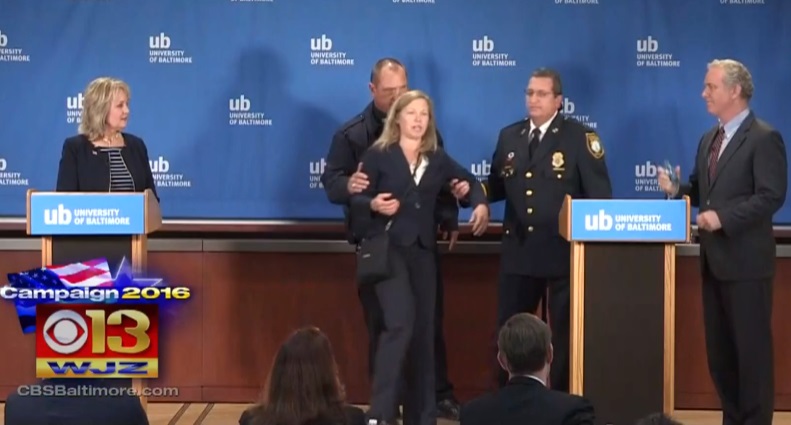By Len Lazarick
Margaret Flowers probably got more coverage from being hauled off the stage by campus cops at the University of Baltimore last week than she did in a whole year of campaigning for U.S. Senate.
Flowers was protesting her exclusion from what was likely the one and only TV debate in the race to replace Barbara Mikulski, that demure and dainty lady from Fells Point.
The irony was that Flowers, about as unthreatening as most pediatricians, was being shut out by the League of Women Voters, founded to give women the right to vote; a public university; a publicly licensed TV station; and that “Light for All” daily newspaper, the Baltimore Sun.
The reason? She had met all the criteria for inclusion, but she wasn’t scoring at least 15% in polls.
As the Green Party nominee, she has been given equal treatment on millions of ballots printed up by the state Board of Elections. But when it comes to actually telling you anything about her quixotic quest, well, the less said the better.
It was just another example of the power of the two-party duopoly in Maryland and national politics. The Democratic and Republican parties do everything in their power to keep people like Flowers off the ballot and off the air.
Complicit media
The media is complicit in this power play, including MarylandReporter.com. Our news website does a daily roundup from many news sources. Most of those news sources have treated Flowers as an afterthought.
MarylandReporter.com did cover the only forum in which the three Senate hopefuls appeared together and were given equal treatment three weeks ago. But no other reporters were there at this Saturday morning event at a black Baptist church in Columbia.
What might have Flowers have said if she had been allowed to participate in Wednesday’s debate? Fortunately, voters don’t have to imagine that at all.
The Baltimore based Real News Network interviewed Flowers the next day, and asked her a few of the same questions that went to Republican Kathy Szeliga and Democrat Chris Van Hollen, who by the way, did agree to have Flowers participate, but still went on without her. The video leads off with Flowers ejection from the stage, shouting all the way; and she answers questions on health care, Syria, college debt (she favors free higher education), police brutality, the Trans-Pacific Partnership (all three oppose it) and many others sent in by viewers.
Throwing herself into it
Flowers, 54, a graduate of University of Maryland Medical School, gave up practicing medicine 10 years ago.
“Once you start getting in advocacy, you have to throw yourself into it pretty completely to be successful,” she said in an interview over coffee at the Double T diner in Catonsville on Friday.
“I’m really interested in shifting political power,” Flowers said. She got into political activism by working to promote universal health care and a single-payer system, what she prefers to call Medicare for all.
“This [current] system is not working, we’re losing doctors, people are not getting they health care they need,” Flowers said. “It really serves the wealthy interests.”
Her first act of civil disobedience came at a Senate Finance Committee hearing in 2009 when committee chairman Max Baucus (now ambassador to China) refused to schedule witnesses on the public option in the Affordable Care Act — health insurance directly from the government, like Medicare.
Flowers said she does not advocate government-controlled health care. She wants it “publicly financed, but privately delivered.”
This is “the most cost efficient way to pay for health care” and gives people more choices, because all providers would be part of the system, not the “narrow network” of doctors that insurance companies now provide.
“We have to see health care as a part of the whole economic justice movement,” Flowers said. “I can’t be a doc in this system. It is failing. We need to work to change it.”
“The wealth divide is one of our biggest health care problems” and is the cause of “the greatest disparity” in health outcomes.
Plutocracy for the wealthy
She was also part of movement pushing for net neutrality, the concept that everyone should have equal access to the Internet regardless of their usage or ability to pay.
Running for the U.S. Senate, her first stab at political office, is part of building a political movement for economic justice to counter the growing wealth divide, growing poverty and growing personal debt.
“Our political system is a plutocracy. It is for the wealthy,” Flowers said.
So she’s a Communist?
“I get that all the time,” Flowers said. “I’m for identifying what the problems are and what works.”
“I’m not advocating for communism. We need a system so that people can meet their basic needs,” Flowers said. “When someone says I’m a communist, I say I’m a realist. The system isn’t working.”
For instance, she advocates putting public funds, such as taxpayer dollars, into a public bank that serves the public, not the huge commercial banks that dominate the economy. North Dakota has had such a public bank since 1919.
Not a communist, not a socialist
So you’re not communist, but you are a socialist, right?
“No, I’m not a socialist,” Flowers said “Some of our institutions need to be public institutions when they serve the public good,” such as public libraries, public schools and fire departments.
“I’m for what actually works,” she said, and the current economy doesn’t work for everyone.
Flowers doesn’t expect to come close to winning the election. “People don’t usually win their first time,” she laughs. “This is about building a platform for issues.”
There are 13 Green Party candidates across Maryland, and she said many have run strong campaigns, such as Joshua Harris running for Baltimore mayor.
“Voting for Democrats or Republicans is not going to bring the change that we need,” Flowers said.





I’m more concerned about the framing of dissent as being “radical, extreme, trouble making”and the lousy old tactics of labeling those who expose the brutal inequality of opportunities to speak out, as socialist and communist. Throwing Greens in the bucket of radicals or eco-terrorists is by now a strategy that you should all understand and learn from it. Exposing the truth, raising awareness, organizing in the ways we have been given, supporting the orgs we have come to trust, is NOT working. Maybe when Activism is not only framed as extremism and against the orderly will of society, you will all find out that there are ways to reframe the way we resist and reframe how we express our grievances #repeace
Regarding Medicare for all: If profit is the enemy in Health care, then the same is true in housing, food, emergency services, and even trash collection. In principle, this seems to be advocating for the same socialist models that have failed everywhere else in the world. Current socialist systems that survive with decent medical systems are new comers to socialism, having gotten their wealth from capitalism. Moreover – Canadians and certain European counties that have good or better medical programs than ours do so because 1.) They are under our nuclear umbrella 2.) They rely on our medical research which is 5 times the next 7 largest other countries expenditures combined. At $6500 a head in US medical expenditure – times 330 million US residents (which would grow fast if medical care was free) comes to 2.145 trillion dollars. the Governments yearly take is 3.85 trillion, from which you need to subtract 1 trillion for social security – meaning – there will never be enough money for single payer, even without insurance companies or profit. This is a well meaning but sadly naive position for such smart people to take. I certainly don’t expect good doctors like Ms. Flowers to work for no profit…Drs. have families to feed too.
OMG, We’ve run out of time? Does that mean the elections off?
Turn the hour glass over you idiots, you can’t run out of time, time will out run you.
I received this email from the League of Women Voters
Your article on Margaret Flowers’ candidacy misrepresented the role of the League of Women Voters (and other cosponsors) in the candidates forum that was held at the University of Baltimore. Had you contacted us before writing about our policy, you would have had more accurate information about all our forums and would have understood why the University of Baltimore forum was different.
We invited all three Senate candidates who were on the November ballot to a forum we sponsored at Chesapeake College, which was scheduled for an hour and a half. In contrast, when we cosponsor a forum with a television broadcaster (WJZ-TV in this case), the tight limit of a one hour broadcast leads station news teams to press to limit the number of candidates to two. Adding a third candidate means that fewer issues would be covered or too little time would be available for complete answers. Given those limits, all cosponsors of the debate agreed to accept the criteria for broadcast debates that has been used by the League of Women Voters of Maryland for many years – no candidate polling over 15% may be excluded from a debate.
Some have asserted that our polling standard is too high as the commercial media do not cover third party candidates, a bias that you acknowledged in your article. It is not up to the League of Women Voters to overcome the disadvantages of any candidacy, including those resulting from media bias. It is particularly galling that you cast blame on the League when we publish the only resource that gives equal coverage to every candidate, the Voters’ Guide. We don’t expect you or any other reporter to be a cheerleader for the League, but we do expect that you will check the facts before you publish a story that casts us in a false light.
Sincerely,
Ralph Watkins
Vice President, Director of Voters Service League of Women Voters of Maryland
So WJZ is to blame, and the station did not want a messy three-person debate. In this case, this policy was not fair to the voters, and the League colluded with discrimination that excluded a candidate on 2 million ballots. The fact is that the League of Women Voters label implies fairness. There are often high-minded reasons to justify discrimination. The League should not have participated in this blatant discrimination against a woman candidate with interesting things to say.
Your article was right on the money. The response from the LWV sure didn’t paint themselves in a good light…thanks for posting it. People need to know.
“net neutrality, the concept that everyone should have equal access to the Internet regardless of their usage or ability to pay.” Um that’s not really what net neutrality is. Doing my due diligence researching options before the election and I wish I knew if it was the candidate or the author that didn’t understand it. There’s not a whole lot of info to go on with Flowers, so it wouldn’t be a good sign if the candidate was pushing a position without bothering to look into what it was or if she’s being disingenuous in making it sound like it’s something it’s not.
Good job at complaining without adding a single piece of useful information. If that’s not what net neutrality is, what is it?
It’s not easy being Green.